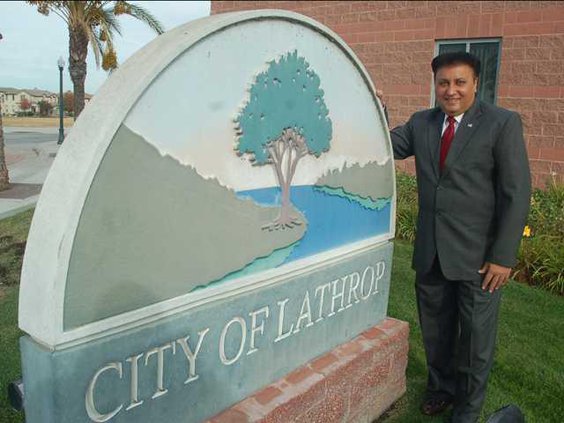You’re supposed to have a grand vision when you’re the mayor of a community.
And Sonny Dhaliwal is no exception.
For the last year he’s been at the helm of the city that he loves and is presiding over a period of relative prosperity. Just a few years ago Lathrop was facing a massive multi-million dollar deficit, and the cuts they made to stay solvent went deep.
Those days are long gone, and Dhaliwal and the rest of the council are blessed with the opportunity to see development finally pick up in the community – starting with the first 200 homes of the River Islands development and continuing with the firm that agreed to take over the blown agreement between Lathrop and Richland Planned Communities.
Dhaliwal doesn’t brag. He’s calculating in his decisions – picking his words carefully and representing ideas that he knows are good for the city. Some look at it as a shortcoming or something that’s less that genuine, but his smile immediately negates that – he’s happy to be doing what he’s doing, and he truly does care about the city that he represents and the people that live in it.
“Former council member Bob Oliver used to say that ‘public service is the rent you pay for the space you occupy,’” Dhaliwal said. “I always like that. It made sense to me. So when I got involved with the planning commission, staying involved with the city and moving forward was something that I knew I could do.”
By night Dhaliwal works for the Santa Clara Valley Transportation Agency (he works the late maintenance shift). And by day he’s dedicated to his position as mayor – buzzing around city hall and reaching out to people in the community to take the pulse of the people and find out what it is that they want.
It’s not an easy task. More often than not the only people who do speak up are those that aren’t happy, and the negativity can be draining. For the first time in years Lathrop council meetings aren’t full of infighting and back-and-forth low-blows.
But being part of the community doesn’t mean anything if there isn’t any progress.
One of the biggest challenges that the city is facing, Dhaliwal said, is bringing head-of-household jobs to the community – a task that was put into sharp focus this week when it was announced that the Pilkington float glass manufacturing plant would be closing down after 51 years of operation. More than 100 employees will be out of work by next August.
“It’s really all about balance. If you build houses you have to make sure that you adequate public safety in place, and the right infrastructure and schools,” he said. “But you also need to make sure that you have jobs for the people that move into your community. That’s something that we’re really working hard on bringing to Lathrop so that people don’t have to commute to Sacramento or the Bay Area.
“You have to have a regional approach when you’re facing growth like we are. You have to take all of the factors into account.”
That regional approach is a big part of how he approaches his office and the tasks associated with it.
When the City of Manteca announced the Center Point business park idea that would stretch from Airport Way to the Union Pacific railroad tracks and would generate a massive amount of truck traffic, Lathrop filed a lawsuit claiming that the mitigation efforts weren’t taking its cities concerns into account. The litigation has since been settled, and when the first building broke ground on Thursday morning, Lathrop City Manager Steve Salvatore was on hand for the festivities.
Working together, Dhaliwal said, is crucial.
“Whenever a city brings in a project, we need to support that,” he said. “Whether it’s Center Point in Manteca or Amazon in Tracy or jobs at the Port of Stockton – they’re not generating jobs just for their cities, but for residents of the entire region. One of the things that we need to focus on is creating high-paying, head-of-household jobs, and if another community is going to have them, we need to support them because it benefits us as well.”
When he isn’t working or tending to city business Dhaliwal likes to play softball at Big League Dreams and spend time with his family – his wife Ruby and their four children.
Dhaliwal keeps Lathrop on road to prosperity





